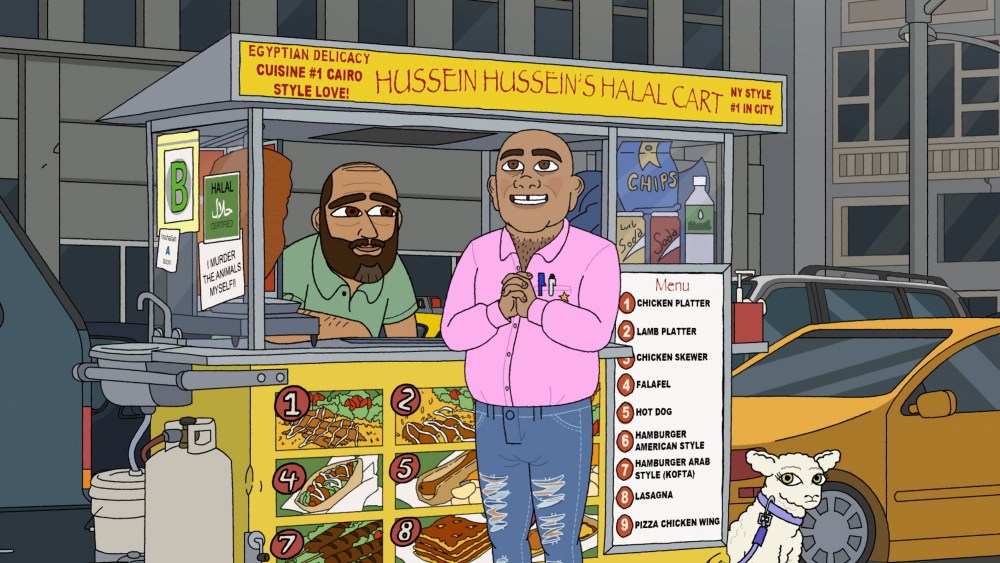Ramy Youssef Sitcom Is Poignant
The fourth episode of “Ramy,” the semi-autobiographical Hulu show starring and co-created by namesake comedian Ramy Youssef, took the audience back to September 2001 — a traumatic time for all Americans, but especially for a tweenage Egyptian-American Muslim living just across the river from Manhattan. “Strawberries” juxtaposed the broad reality of Bush-era Islamophobia through the specific experience of middle school-aged Ramy, who’s more concerned with learning to masturbate like his peers than with national security. The plotline’s matter-of-fact profanity at once punctured any sense of simplistic morality and underlined that world events always coexist with everyday indignities.
Six years after “Strawberries” first aired in 2019, Youssef has expanded its concise, clever story into an entire season of TV. Co-created with Pam Brady (“South Park,” “Lady Dynamite”), the Amazon Prime Video series “#1 Happy Family USA” uses animation to heighten the absurdity facing Youssef’s surrogate, here named Rumi, even further. “Strawberries” had Osama bin Laden himself appear in Ramy’s New Jersey kitchen; “#1 Happy Family USA” gives Rumi a talking pet lamb who offers advice on illegal downloading. Predictably, expanding a one-off flashback into a full-on show sacrifices some precision and focus. “#1 Happy Family USA” has moments of poignance and humor; surprisingly if problematically for a would-be family sitcom, it’s more effective at the former than the latter. But over eight episodes, it never quite lands on a consistent balance of the two, nor a sense of what it wants to be.
For example: Every episode of “#1 Happy Family USA” includes a “Representation Warning,” a mock MPAA notice (rated H for haram) cautioning viewers not to “use this animated show as cultural representation” for Arabs, Muslims or a rotating third group, such as “white girls named Courtney.” And yet animation’s abstraction inevitably favors the kind of instructional symbolism these warnings seem to thumb their nose at, as when Rumi learns the art of code-switching by transforming from a polo-wearing preppie to a burnt-out stoner to his typical self in seconds. “#1 Happy Family USA” both shrugs off the burden of speaking for others and gladly seizes the pulpit when it likes.
Youssef himself broadens his remit from portraying just his own avatar into a dual role. Not only does he voice Rumi, who speaks in an anxious, high-pitched rasp; Youssef also plunges down an octave to play Rumi’s gruff, penny-pinching dad Hussein, who parks his halal cart outside the Fox News tower. (The family surname is also Hussein, making him Hussein Hussein.) The al-Qaeda attacks send Hussein and his wife Sharia (Salma Hindy) on opposite trajectories. Shaken by a recent loss, Sharia starts wearing a headscarf and stops going by “Sharon” at work. Meanwhile Hussein, desperate to prove himself as an unthreatening American, goes all-in on assimilation. “We, from today, have no culture,” Hussein says. “We are going to show everyone that we are normal people, not terrorists.” And so he shaves his beard, puts up a massive flag over the porch, and even wears shoes in the house. “It is very important,” he tells Rumi, “that we never be ourselves.”
This doomed desperation to earn acceptance is the most compelling strain of “#1 Happy Family USA,” capably expressed in the theme song: “Hello, hello neighbors / You’re afraid of us near you / But the only blood we want / Is to bleed red, white and blue!” Hussein’s sweaty insistence on his love for “Amrika” only intensifies the suspicion of neighbors like the newly divorced FBI agent across the street, voiced by Timothy Olyphant — though it does earn him praise from a colleague as “one of the good ones.” When the Husseins’ garage gets graffitied, Sharia tearfully wishes these people understood that “We’re upset too. We’re scared, just like everyone else.” It’s ironic that all this airs on Amazon Prime, which has otherwise leaned into War on Terror-inflected shows like “Tom Clancy’s Jack Ryan” and “The Terminal List” to which “#1 Happy Family USA” acts as a counterpoint.
Such scenes are effective as drama, but a counterintuitive, if not impossible, fit for an animated family sitcom in the vein of “The Simpsons.” Yet while the opening credits end with barbed gallows humor — armed agents threaten to shoot the Husseins while Rumi gets held up as a human shield — for the most part, the jokes on “#1 Happy Family USA” simply don’t cut as deep as the pathos. Many bits traffic in broad clichés, like Sharia using a sandal to inflict corporal punishment or Rumi attending “Gabagool School.” The animation style, partially informed by the work of executive producer and visual journalist Mona Chalabi, skews simplistic, with character design dominated by big, football-shaped eyes.
“#1 Happy Family USA” is the first adult animated series from A24, continuing the company’s collaboration with Youssef on both “Ramy” and stand-up special “More Feelings.” At a time when xenophobia and federal scrutiny of immigrants are unfortunately, horrifically back in the news, the series certainly channels the zeitgeist as the highbrow studio likes to. On the other hand, “#1 Happy Family USA” is so wedded to its time and place it’s hard to see the show’s 2D version of Hackensack becoming an Everytown like the Simpsons’ hometown of Springfield, preserved in amber and enduring for decades. You’ll feel for the Husseins. You just may not laugh with them, or want to check in with them year after year.
All eight episodes of “#1 Happy Family USA” are now available to stream on Prime.


